Discover Rock's Backpages
Rock's Backpages

 Rock's Backpages
Rock's Backpages
Author: Barney Hoskyns, Mark Pringle, Jasper Murison-Bowie
Subscribed: 200Played: 6,200Subscribe
Share
© 2025 Backpages Limited
Description
Tales from the world's largest archive of music journalism: entertaining interviews with luminaries such as Neil Tennant, Billy Bragg, Pamela Des Barres, Gary Kemp, Vashti Bunyan, Midge Ure, Nick Hornby and Robyn Hitchcock. Thoughtful and informative conversations about all aspects of popular music history, interspersed with clips from exclusive audio interviews that date back to the mid-'60s.
The RBP podcast is hosted by Barney Hoskyns and Mark Pringle and co-hosted & produced by Jasper Murison-Bowie. We're a proud part of Pantheon — the podcast network for music lovers.
218 Episodes
Reverse
For this episode we're joined in our Hammersmith HQ by James ("The Hardest Working Man In Show Business") Brown.
The former NME star and founder of "lads' mag" progenitor loaded takes us back to his Yorkshire boyhood in Headingley. He recalls his parents' record collection, the first gigs he attended as the class "smart-arse" at Lawnswood School... and his acclaimed '80s fanzine Attack On Bzag!
Our guest's account of how he came to contribute to Sounds leads to clips from the late Andy Gill's 1991 audio interview with the KLF, the maverick duo of Bill Drummond and Jimmy Cauty whom James championed in the paper's pages in 1987.
After waxing nostalgic about his days at the NME, James gives us the origin story of the hugely successful loaded ("for men who should know better") and talks us through the publishing phenomenon it triggered. A discussion follows of '90s sexism and its connection to the misogyny of today's "Manosphere".
Many thanks to special guest James Brown. Animal House: Music, Magazines, Mayhem is published by Quercus and available now from all good bookshops. Zine Age Kicks is available through James' Instagram, @jamesjamesbrown.
Pieces discussed: The Beastie Boys: Keep Taking The Tabloids, Mark E Smith, Nick Cave & Shane MacGowan: The Three Horsemen Of The Apocalypse, The KLF audio and The decline of lads' mags: Unloaded, and now the party is over.
In this episode we welcome not one but two wonderful guests to RBP Towers. Susan Compo and Derek Ridgers have been trans-Atlantic pals for decades and first met on a FourFourTwo assignment to interview and photograph the L.A.-expats "soccer" team Hollywood United.
Starting with Susan's punk years in Southern California, we hear about her memories of seeing the Sex Pistols live in Dallas and Tulsa in January 1978. She also talks about her trip to London the year before, prompting Derek's recall of the punk scene he began photographing at clubs such as Vortex and the Roxy. Derek then rewinds his story to his late '60s days at Ealing School of Art when fellow student Freddie Mercury nicked his girlfriend in a local pub.
The conversation oscillates between Susan's reflections on her career move – from music journalism to short stories about star-crossed Goths – and Derek's memories of the New Romantic "movement" he documented so brilliantly in early '80s London. In between clips from John Tobler's 1984 audio interview with Spandau Ballet singer Tony Hadley, Derek talks about his approach to his chosen medium.
After touching on Derek's years at Loaded magazine and Susan's terrific books about Warren Oates and David Bowie, we discuss our shared passion for football/"soccer" before paying tribute to Derek's former NME colleague Jack Barron. Jasper then talks us out with quotes from newly-added library pieces about Grandmaster Flash (2000) and Boy George (2024).
Many thanks to special guests Susan Compo and Derek Ridgers. Susan's books, include Malingering and David Bowie and The Man Who Fell To Earth are available from all good bookshops. You can visit Derek's website at derekridgers.com and his latest book, Hello, I Love You, is published by IDEA.
Pieces discussed: The Sex Pistols Shoot To The Top, The Cure: Happily Ever After, White Noise/White Sands: The Bowie Who Fell to Earth, Gary Kemp on the RBP podcast, New Romantics, Electro-Disco: Night Moves, Spandau Ballet's Tony Hadley audio, Jack Barron, Nick Cave: The Needle And The Damage Done, The Stone Roses: Bliss This House, Gregory Isaacs: Gregorian Rants, Gong: The Gong Remains The Same, The Adventures of Grandmaster Flash in the Game of Life and Boy George.
In this episode we're joined by Pete Paphides, former rock critic for the London Times and author of 2020's acclaimed memoir Broken Greek.
We start with our guest's unique "'Starman' moment" – seeing the Brotherhood of Man lip-sync to the ghastly 'Save Your Kisses for Me' on Top of the Pops in 1976 – and then plunge straight into a celebration of his favourite pop group ABBA. We hear about his love of the Swedes' countless classic songs; his interviews with Björn Ulvaeus and Benny Andersson; and how the quartet was indirectly responsible for his marriage to fellow scribe Caitlin Moran.
Pete talks us through his journalistic odyssey from ill-fated pubescent fanzine Pop Scene via the longer-lasting Perturbed to Jim Arundel's mentoring of him at Melody Maker. Talk of his tenures at Time Out and The Times leads to his memory of "falling back in love with music" after years of being glutted with free records.
The 60th anniversary of the release of 'Uptight' takes us into clips from Amy Linden's 1995 audio interview with the musical colossus that is Stevie Wonder – and a broad discussion of the Motown legend's creative evolution from 'Uptight' to Songs in the Key of Life.
After Mark quotes from a 1963 review of the Beatles' first album Please Please Me, Jasper talks us out with his thoughts on Jaan Uhelszki's 2015 interview with the extraordinary Joanna Newsom.
For this episode — the first to feature RBP's editorial co-ordinator William Pike — we're joined by Melody Maker legend Simon Price for a discussion of his career, his championing of Manic Street Preachers, and Radiohead's first tour since 2018.
Beginning in the South Wales town of Barry, we hear about Simon's boyhood, his formative pop passions and the first of his distinctive sartorial metamorphoses. He recalls his late '80s move to London and the years at Melody Maker that took in his first interviews with fellow Welshmen the Manics and his integral involvement in the Neo-glam sub-genre known as Romo.
Our guest's review of the first Radiohead album provides the cue for clips from Amy Linden's 1997 audio interview with Thom Yorke and Jonny Greenwood. We hear Thom talking about the just-released OK Computer and about his beef with Melody Maker itself: this prompts a general discussion of the band's standing as they prepare for the first date of their European tour.
After reflecting on the 13 years he spent reviewing gigs for the Independent on Sunday, Simon discusses the gestation of 2021's Curepedia, the "Cure A-Z" he assembled for White Rabbit books. We conclude the episode with tributes to jazz drummer Jack DeJohnette and keyboardist David Ball, phlegmatic foil to Soft Cell frontman Marc Almond.
Many thanks to special guest Simon Price. Curepedia: An A–Z of the Cure is published by White Rabbit and available from all good bookshops.
Pieces discussed: Articles, interviews and reviews from Simon Price, Manic Street Preachers: Drags to Riches, Radiohead: Pablo Honey, Radiohead audio (1997), Jack DeJohnette: More Than One Way, Soft Cell: Cell Division and The Tainted Life of Soft Cell
In this episode we invite the highly entertaining Lisa Verrico to join us from her native Glasgow and talk us through her career from IPC's Vox magazine to The Times.
Commencing with her memory of first hearing Prince's 'Little Red Corvette' as a kid on holiday in Spain, our guest recalls her days of raving (and working in radio) before describing how she got her foot in the door at Vox. Hair-raising Mancunian encounters with Happy Mondays and Mark E. Smith serve as preludes to Lisa's hilarious 1994 interview with Oasis. We hear her "bootleg recording" of the Gallagher brothers' competing impersonations of Mick Jagger on the band's impromptu rendition of 'You Can't Always Get What You Want'.
A broad discussion of what the '90s meant for pop culture takes in Lisa's memories of Oasis hanger-on Evan Dando and of the altogether different My Bloody Valentine. Clips from a 1989 audio interview with the latter's Kevin Shields and bandmates prompt reflections on MBV's extraordinary sound and their somewhat dysfunctional relationship with Creation's Alan McGee.
We return to Lisa's own story by asking her what happened after Vox folded in 1998 — and how she wound up reviewing (and interviewing) for The Times for 25 years. We also discuss how much the live music experience has changed in that time. Finally, we hear about our guest's 2019 trip to L.A. to interview 17-year-old superstar-in-the-making Billie Eilish.
After paying heartfelt tribute to cult neo-soul star D'Angelo — note that news of the death of former KISS guitarist Ace Frehley only reached us after this episode was recorded — Mark quotes from a 1984 interview with jazz giant Wynton Marsalis and Jasper takes us out with his thoughts on Joe Muggs' 2011 interview with the great James Blake.
Many thanks to special guest Lisa Verrico. You can find her writing in The Times.
Pieces discussed: Oasis: Shake'n'vac, Evan Dando: Baby I'm Bored, Evan Dando: "I get the feeling I'm being bullshitted", Evan Dando: The Smoker You Drink, The Player You Get, Evan Dando: Different Drum, My Bloody Valentine audio, Billie Eilish, D'Angelo: Soul Asylum, On D'Angelo and the Birth of Neo-Soul, D'Angelo: Black Messiah, Wynton Marsalis: The Hottest Lips in America and James Blake: Point Blake.
In this episode, the great R&B/hip hop writer Michael A. Gonzales joins us online from Baltimore to look back on his long career.
We start with our guest's formative musical memories, from hearing Isaac Hayes' 'Theme from Shaft' and meeting Little Anthony & the Imperials to seeing the Jackson Five live at Radio City Music Hall in February 1975. His earliest inklings of New York's rap scene take us back to his 2008 piece about the trailblazing DJ Kool Herc playing block parties in the Bronx of the early '70s.
We hear about Michael's first pieces for The Source, arguably the most important hip hop magazine of the late '80s and '90s, and about his collaboration with Havelock Nelson on the 1991 book Bring the Noise. We also discuss a Barry White interview he did for Danyel Smith at Vibe and learn about his friendships with fellow writers from Barry Michael Cooper to Amy Linden.
The latter's audio interview with TLC ties in with Michael's own writing on the hugely successful Atlanta trio, and we listen to clips of Chilli, T-Boz and Left Eye talking to Amy in late 1998 about their upcoming third album FanMail.
After Mark quotes from pieces about the Velvet Underground (1967) and Earth, Wind & Fire (1974), Jasper talks us out with his thoughts on reviews of Radiohead's Kid A (2000) and – by RBP's William Pike – the Bug Club live in London last month.
Many thanks to special guest Michael A. Gonzales. Find him on Substack at substack.com/@michaelagonzales1 and on Instagram @bigmikeg151.
Pieces discussed: Michael A. Gonzales, D.J. Kool Herc: The Holy House of Hip-hop, Barry White: Blackberry Jam, TLC Marks 20 Years of CrazySexyCool, TLC (1998), The Velvet Underground and Nico (Verve), Earth, Wind and Fire: The Sound of the Streets, Orrin Keepnews' Milestones, Radiohead: Kid A and The Bug Club at the MOTH Club.
In this episode, we ask one of the greatest music writers of the rock and roll era to talk about Mystery Train as he celebrates its 50th anniversary with a brand-new edition of his classic book.
Talking to us from Oakland, 6,000 miles away in his native Northern California, Greil Marcus looks back on the pivotal moments that led to his starting work on Mystery Train in the fall of 1972: his experiences as a student at Berkeley, his discovery of film critic Pauline Kael and his early writing for Rolling Stone.
From there we focus on the book's extraordinary chapters about Sly Stone and Elvis Presley before relating its overarching theme – America as an "invented nation" – to the Trump administration's assault on the diversity that produced so much great art from Walt Whitman and Herman Melville to Robert Johnson and Randy Newman.
A somewhat abrupt switch takes us over to our side of the pond and our guest's second book: the vast "secret history of the 20th Century" that was 1989's Lipstick Traces, along with the 1993 collection of his punk writings entitled In the Fascist Bathroom.
Clips from Paul Moody's 2018 audio interview with Jamie Reid – the subversive graphic designer who became Malcolm McLaren's principal partner in iconographic crime – prompt Greil's reflections on what made (the) Sex Pistols such a vital sea-change in the subculture of rock and roll.
Many thanks to special guest Greil Marcus. The 50th anniversary edition of Mystery Train is published by Faber and available now.
Pieces discussed: Greil Marcus, Greil Marcus: A Life In Writing, The Band: We Can Talk About It Now, Jamie Reid audio, The Beatles: Sgt. Pepper's Lonely Hearts Club Band (Parlophone), Ray Davies: A Study In Frustration, The Pet Shop Boys: Hip, Clever and Pop and The Black Keys Acknowledge Their Muses on Delta Kream.
For this special "bonus" episode of the Rock's Backpages podcast — fittingly number 211 (geddit?) — we're joined once again by The Guardian's Alexis Petridis for a discussion of timeless rock mockumentary This is Spinal Tap and its breathlessly-awaited sequel Spinal Tap II: The End Continues...
With reference to A Fine Line Between Stupid and Clever, the newly-published "story of Spinal Tap" told by Rob "Marty DiBergi" Reiner — with help from our good friend David Kamp (an excellent podcast guest back in 2021) – we reflect on what made the original 1984 film so special and what challenges its 2025 sequel faced.
Along the way we celebrate the satirical genius of Michael "David St. Hubbins" McKean, Harry "Derek Smalls" Shearer and Christopher "Nigel Tufnel" Guest (as well as the latter's subsequent masterpieces from Waiting for Guffman to A Mighty Wind) and ponder the wisdom or otherwise of including cameos by Sirs Elton John and Paul McCartney in the new film. Meanwhile our highly-respected guest — who of course ghosted Sir Elton's autobiography Me — recalls his own close encounter with Tap in 2009.
This end does not continue.
Pieces discussed: Spinal Tap's Metal Memories, Spinal Tap: It's an Ill Wind..., Spinal Tap: Wembley Arena, London and Spinal Tap: Still smelling the glove.
For this episode we're joined by the immensely respected Alexis Petridis, The Guardian's principal pop critic since September 2001.
Our guest tells us about his childhood in Yorkshire, his teenage years in Buckinghamshire and his initiation into the Acid House scene while at Cambridge University. Work experience at MixMag in the mid-'90s led to his becoming that dance/clubbing monthly's Features Editor – and then to a slightly less felicitous eight months as editor of Select.
A short digression on "Britpop nostalgia" leads us to discussion of the changing role of music journalism and to our guest's near-quarter-century tenure at "the Graun". Jasper quizzes him about his encounters with Daft Punk and we bring matters up to date by discussing the fabulous Irish singer CMAT, whom Alexis interviewed this summer.
The episode concludes after Mark introduces clips from Mat Snow's 1992 audio interview with Gene Simmons and Paul Stanley of KISS, 50 years after the double album Alive! made them a '70s rock phenomenon.
Many thanks to special guest Alexis Petridis. Find his writing in the pages of the Guardian.
Alexis Petridis: 'I used to dream about owning every record in the world', How Music Criticism Lost Its Edge, Britpop nostalgia, Suede: Roll Over, Jimmy Dean, Why Daft Punk's New Album Has Given New Life To The Music Business, A Celebration of Prince, CMAT interview and KISS audio.
In this episode we invite David Nathan to look back on his illustrious 60 years as "the British Ambassador of Soul".
Our guest commences by recalling his gateway into Black American music: the covers of Shirelles and Miracles classics included on the first two Beatles albums. He furthermore describes the thrill of seeing Motown star Mary Wells supporting the Fab Four at Kilburn's State Cinema in October 1964, followed by his founding of the Nina Simone Appreciation Society.
We hear about the Soul City record store David ran with the legendary Dave Godin – and about John Abbey's trailblazing Blues & Soul magazine, for which our guest began writing in 1968. Barney quotes from David's 1968 B&S profile of Aretha Franklin, with whom he later enjoyed a long friendship. The release of Make It Easy on Yourself – a box set David compiled of Dionne Warwick's immortal Scepter recordings – is the cue for us to hear clips from his 2012 audio interview with the Bacharach & David muse... and to learn about another "soulful diva" who became his close friend.
We bring our guest's story more up-to-date with his reflections on yet another diva/pal, the one and only Chaka Khan. Mention of the former Rufus frontwoman's favourite producer, Arif Mardin, leads to discussion of Main Course, the Mardin-helmed album on which the Bee Gees "went disco" 50 long summers ago. David then reminisces about his own disco dalliances in '70s New York and his mid-'80s coastal switch to L.A.
We wrap up by paying tribute to another key white writer on Black R&B and soul: the late Michael Lydon, whose voice can be heard in this episode introducing his fabulous 1977 audio interview with the wicked Wilson Pickett.
Mark and Jasper talk us out with their thoughts on (and quotes from) pieces recently added to the RBP library, including Jim Farber's 1978 interview with Earth, Wind & Fire's Maurice White and Ian Winwood's 2001 trashing of Creed live in Louisville.
Many thanks to special guest David Nathan. Visit his website at davidnathan.com. Dionne Warwick: Make It Easy On Yourself – The Scepter Recordings 1962-1971 is out now on SoulMusic Records.
Pieces discussed: Aretha Franklin: Aretha's Artistry, Dionne Warwick (2012), Chaka Khan: Back...From Back In The Day, Back on course with the Bee Gees, How the Bee Gees got into Disco: An Oral History of Main Course, Arif Mardin: Producer, Wilson Pickett (1977), Return of the Wicked Pickett, Top Tunes: The Beach Boys, Bobby Womack: Bobby's got Understanding, Earth Wind & Fire: Extraterrestrial R&B, Creed live and From Kingston with love.
For this episode we're joined online from northwest Massachusetts by the legendary Byron Coley, champion of all things weird and non-mainstream.
After describing his somewhat peripatetic childhood, our guest explains – very amusingly – why as a teenager he hated the Beatles and what led him eventually to the more subversive sounds of the Mothers of Invention and their ilk. A digression on the Grateful Dead – whose Jerry Garcia we lost 30 years ago this month – is followed by Byron's memories of first reading R. Meltzer and Nick Tosches in Crawdaddy! and Creem... and how a teaching assistant grad student inspired him to "write like you talk".
After Barney reads from Byron's 1980 New York Rocker piece on Lydia Lunch's 8-Eyed Spy – prompting our guest's recall of first seeing her No Wave trailblazers Teenage Jesus & the Jerks live – we hear about his 1978 Rocker interview with the incomparable Captain Beefheart. This in turn leads to clips from Gary Lucas' audio interview with the artist born Don Van Vliet, recorded in January 1972.
After a quick late '70s/early '80s detour via his temporarily adopted California, Byron talks about his return to the East Coast and his writing for Boston's Forced Exposure – not to mention his rather more lucrative "Underground" columns for Spin. In passing he explains how his friendship with Sonic Youth led to a declaration of war on Bob ("Dean of American Rock Critics") Christgau. We finish up by paying tribute to blue-eyed-soul man Terry Reid and beloved Salsa star Eddie Palmieri.
Finally, Mark and Jasper talk us out with remarks on newly-added library pieces about the Legendary Stardust Cowboy (1968), Ronnie Wood and cronies (1974) and Lana Del Rey (2019).
Many thanks to special guest Byron Coley. Find his book C'est La Guerre in all good bookshops and follow him on BlueSky @byroncoley.bsky.social.
Pieces discussed: Way Out West With 8-Eyed Spy, Sonic Youth, Captain Beefheart: Grow Fins, Jason Gross interviews Byron Coley, Jerome John Garcia 1942-1995, The Grateful Dead: Burnout Sets In, The Exhumation of The Dead, Captain Beefheart audio, Terry Reid, Terry’s Funky Steamer, Eddie Palmieri: The Man Who Stirred Up Salsa, Top Tunes: the Legendary Stardust Cowboy, The Night Ron, Keith, Mac and Rod played a gig without falling over and Lana Del Rey Lives In America's Messy Subconscious.
For this episode we're joined by the excellent Val Mabbs, who talks to us about writing for Record Mirror in the late '60s and early '70s.
We start with our guest's early life as a mod in Hertfordshire – and her memories of seeing the Who/the High Numbers in 1964/5. Val then explains how she got her foot in the door at the Mirror and recalls colleagues such as Norman Jopling, Charlie Gillett and Lon Goddard, not forgetting Peter Jones, the editor who first spotted her potential as an interviewer.
Val talks us through her encounters with such legends as Jimi Hendrix, John Lennon and Marc Bolan (not to mention Status Quo, for whose double-denim "outfits" she can take indirect credit). En passant we hear clips from Chris Welch's 2005 audio interview with John Walker, surely the handsomest of the three Walker "Brothers" he first met in 1965.
After Barney gives a nod to the week's free feature about Bob Dylan "going electric" at 1965's Newport Folk Festival, Val resumes her story and brings us up to the present day. We also pay tribute to the late Ozzy Osbourne and discuss the real origins of heavy metal.
Finally, Mark and Jasper talk us out with remarks on newly-added library pieces about Graham Nash (1967), Lady Gaga (2012) and Billie Eilish (2019).
Many thanks to special guest Val Mabbs.
Pieces discussed: Jimi Hendrix: "Western Movie For Jimi" Says The Man Himself, T. Rex: Marc's science fiction film, John and Yoko: The Apple and the Grapefruit, The Walker Brothers' John Walker audio, Al Kooper: The On the Tracks Interview, How Bob Dylan And The Holy Trinity Changed Music Forever, Scene of the Crime: Bob Dylan at Newport, Elijah Wald: Dylan Goes Electric! Newport, Seeger, Dylan and the Night That Split the '60s, Black Sabbath, Ozzy Osbourne: How Black Was My Sabbath, Ozzy Osbourne: Lord of the Wings, The Hollies: The change in Graham, Lady Gaga: The most extraordinary popstar Mark Ellen has ever met and Billie Eilish at Reading Festival.
In this episode we welcome novelist and screenwriter John Niven to "RBP Towers" to ask him about his career and his acclaimed novels.
We start with the Wishing Stones, the post-C86 combo for whom John played guitar in the late '80s, and progress swiftly to the subject of his caustic 2008 classic Kill Your Friends — the UK's drug-riddled music industry, in which he toiled through the '90s.
After John talks about his uncanny 2005 novella Music from Big Pink – inspired by the Band album of the same name — we switch to the week's featured artist (and vocal inspiration to The Band's Richard Manuel) Bobby "Blue" Bland. We then pivot to the sublime writing of Deep Blues author and New York Times pop critic Robert Palmer, who would have turned 80 this summer.
We mark the 50th anniversary of the deeply unloved Metal Machine Music by listening to — and discussing clips from — a 1996 audio interview with the inimitably supercilious Lou Reed. Finally, we return to our guest's fiction and ask him about his brand-new novel The Fathers.
Many thanks to special guest John Niven. His new novel The Fathers is published by Canongate and available now from all good bookshops.
John Niven's Music from Big Pink: A Foreword, Bobby Blue Bland: Arrival!, Bobby Bland: This Time He's Here for Good, A Tribute To Bobby "Blue" Bland, Articles, interviews and reviews from Robert Palmer, Etta James: The Comeback of a Fifties R&B Star, The Sun King: Sam Phillips, Robert Palmer: Recording the Blues in North Mississippi, Steely Dan: Disaster and triumph in the Custerdome, Lou Reed audio, "Jellybean" Benitez and Arthur Baker: The Producers and George Shearing, 1919–2011.
In this episode we welcome the great soul scribe Tony Cummings to Hammersmith to discuss the subject of his classic 1975 book The Sound of Philadelphia.
Tony travelled all the way down from his adopted Stoke-on-Trent to answer our questions about his earliest musical passions in his native Plymouth and the launch of his pioneering '60s fanzines Soul, Soul Music and Shout. He goes on to talk about his contributions to (and editorship of) Black Music magazine – and his deep immersion in the "Philly Soul" sound patented by Kenny Gamble, Leon Huff and Thom Bell. We hear about the extraordinary stable of musicians who performed on timeless hits by acts such as the O'Jays, the Three Degrees and Harold Melvin & the Blue Notes.
Clips from audio interviews with Kenny Gamble and – from 1976 – the Stylistics' Herb Murrell prompt reflections on the lavish sound and sophistication of R&B classics by everyone from the Delfonics and Jerry Butler to Teddy Pendergrass and McFadden & Whitehead.
Many thanks to special guest Tony Cummings.
Pieces discussed: Inside the Philly Sound, MFSB, TCB, The Stylistics, Gamble-Huff, Thom Bell and the Philly Groove, Hit Producer Thom Bell: Philly Soul & the R&B Flugelhorn, "Philadelphia was the party with a tormented soul", Kenny Gamble and Leon Huff audio, The Stylistics' Herb Murrell audio, Why are we so hard on our music press? and Linkin Park.
For this episode we're joined in our Hammersmith lair by the highly respected Chris Bohn, known better these days by his alias Biba Kopf (cue a nod to Berlin Alexanderplatz author Alfred Döblin...) The veteran NME contributor and sometime editor-in-chief of The Wire talks about his long career as a Europhile connoisseur of extreme and out-there music.
We start by asking our guest about his mother's experience as a teenage refugee fleeing her native Silesia after the advance of the Red Army in 1945 – and her subsequent settling in the English Midlands. We learn about Chris' journalistic training on the Sutton Coldfield News and his subsequent travels around Europe, where he reconnected with relatives in West (and East) Germany.
Chris reminisces about his first London job as a press officer for Polydor Records, for whom he chaperoned Siouxsie & the Banshees to tapings of Top of the Pops. He then talks us through his writing career from Melody Maker and NME to decades-long association with The Wire. Among the articles mentioned are his 1979 live review of Joy Division, his groundbreaking 1981 on-the-road piece "Trans-Europe Express", and his interviews with Nina Hagen (1979) and Einstürzende Neubauten (1983). Discussion of The Wire leads us into clips from an audio interview with Wire icon Ornette Coleman … by Wire mainstay David Toop.
We conclude the episode by paying heartfelt tribute to two Californian geniuses who left us this week: Family Stone funk pioneer Sly Stone and the Beach Boys' "pocket symphonist" Brian Wilson. We shall not see – or hear – their like again.
Many thanks to special guest Chris Bohn a.k.a. Biba Kopf. Visit the Wire's website at thewire.co.uk to subscribe digitally and in print.
Pieces discussed: Nina Hagen: West Is Best, Einstürzende Neubauten: Let's Hear It For The Untergang Show, Ornette Coleman (1995), Sly & The Family Stone: Sly Buries Underground And Has Fun!, Not Only Sly, But Sometimes Just Plain Damn Evasive, Sly Stone's Higher Power, Some Producers' Hints From Beach Boy Brian, Brian Wilson, Brian Wilson: Beach Boy, Pop Visionary, Wounded Soul, The Devil and Jerry Lee Lewis and Group Home: Supa Group.
For this episode we're joined – all the way from Brooklyn – by acclaimed author and sometime drummer Jonathan Gould.
The native New Yorker recalls his early musical epiphanies, his introduction to the drums and his studying under famed jazz drummer Alan Dawson in mid-'70s Boston. He also reminisces about his years in Woodstock, N.Y., and his association with The Band's Richard Manuel.
Our very personable guest explains his conversion to writing about music and the long gestation of his epic Beatles book Can't Buy Me Love (2007). From there we jump to 2017's equally praised Otis Redding: An Unfinished Life, an excuse not just to talk about The Big O but to hear clips from audio interviews with Stax Records/Booker T. & the M.G.'s legends Duck Dunn and Steve Cropper.
Finally, we get to the subjects of his latest enormo-tome Burning Down the House: Talking Heads. Jonathan talks about his experience of writing the book, the band's unique brilliance and internal frictions, and their complicated relationship with producer/"collaborator" Brian Eno.
After we've paid our respects to beloved EMAP Metro writer-publisher Barry McIlheney and to fomrer McCoy/Johnny and Edgar Winter sideman/All-American Boy Rick(y) Derringer, Jasper talks us out with his thoughts on pop's most misunderstood songs.
In this episode we welcome the great Paul Gambaccini into RBP's world and ask him about his 50+ years as one of Britain's best-loved broadcasters.
"The Great Gambo" tells us about his early radio days at Dartmouth College's WDCR station and explains how he slipped his foot in the door at Rolling Stone in 1970. He then recounts his first meeting with "underground deejay" John Peel (plus his BBC producer John Walters) while still an Oxford postgraduate fleeing Richard Nixon's America,
We ask our guest about his famous Stone interviews with Elton John (and Bernie Taupin) and Paul McCartney, then hear about his Radio 1 debut in 1974. Paul discusses his sexuality, his winding up on the Beeb's "Christmas tree" list, and his nightmare year of being witch-hunted without evidence by the sleuths of Operation Yewtree.
After offering his thoughts on the constitutional crisis in his homeland, our guest expresses his approval of Beyoncé ahead of her "Cowboy Carter" tour's London leg in June. We listen to clips from a 2003 audio interview with "Queen Bey" by The Observer Music Monthly's Simon Garfield.
After Mark quotes from newly-added interviews with Elvis Presley (1969) and Roxy Music's (Brian) Eno (1973), Jasper talks us out with his thoughts on pieces about the Roots (2005) and Beyoncé's sister Solange (2007).
Many thanks to special guest Paul Gambaccini. Hear his radio shows on the air, including the Paul Gambaccini Collection on BBC Radio 2.
Pieces discussed: Paul Gambaccini's writer's page on RBP, The Rolling Stone Interview: Elton John, Paul McCartney, Beyoncé audio, Elvis the Husband talks about Elvis the Pelvis, The Strange World of Roxy Music, The Roots: Growing Underground, Romanthony: A Prince Among Men and Why Solange Matters.
For this episode we're joined – all the way from L.A. – by special guest Bob Merlis. The former head of publicity at Warner-Reprise Records in Burbank talks us through his musical odyssey from his Brooklyn childhood to his continuing PR work for the likes of ZZ Top and Carlene Carter.
We hear about Bob's start at Record World in late '60s New York and the early '70s pieces he wrote for that trade publication and for Warners' short-lived Words & Music. Our guest then talks about his brief stints at RCA and Albert Grossman's Bearsville Records before touching on key acts and moments in the nearly three decades he spent in Burbank: Little Feat's Lowell George, Jerry Wexler producing Etta James and Warners president Joe Smith roasting the infamous Morris Levy. Clips from Dave Zimmer's 1988 audio interview with Neil Young prompt discussion of that quintessential Reprise artist (and his comrades in CSNY).
After Mark quotes from pieces about Elektra Records dropping the MC5 and free-improv guitarist Derek Bailey, Jasper talks us out with reflections on the musical passions of footballer Rio Ferdinand and Houston rapper Chamillionaire.
Many thanks to special guest Bob Merlis. For info on Bob's PR work, visit https://mfhpr.com/m-f-h-at-20.
Pieces discussed: R&B is B(l)ack and Involved, Jerry Wexler Crosses Tracks for Tony Joe, Todd Rundgren Warps Time, Lowell George Talks About Little Feat, Little Feat Keeps On Truckin', Little Feat: How To Construct a "Critics' Band", Neil Young audio, Elektra Records Kicks Out MC5, Derek Bailey: Themes on Improvisation, The Record Doctor: Rio Ferdinand and Chamillionaire: Change.
In this special episode we celebrate the last four years with clips from twelve of the best 100 shows we've recorded in that time.
Following an intro from Spandau Ballet mainmain Gary Kemp speaking in January 2023, we reflect on what we have (or haven't) learned over those four years, then play and discuss clips from these episodes:
Record Mirror legend Norman Jopling on first seeing the "Rollin' Stones" in 1963 (December 2021)
Writer-photographer Val Wilmer on interviewing Jimi Hendrix in 1967 (May 2024)
the Village Voice's Richard Goldstein on not caring if he was "America's first rock critic" (September 2022)
Creem veteran Jaan Uhelszki remembering her "almost famous" colleague Lester Bangs (May 2022)
Author-filmmaker Nelson George on not reviewing the Brothers Johnson as if they were Bob Dylan (July 2021)
Billboard's first rap editor Havelock Nelson on being influenced by Nelson George (March 2025)
NPR's Ann Powers on being influenced by Greil Marcus (June 2024)
The New Statesman's Kate Mossman on her (not-so) secret passion for jazz fusion (February 2022)
"Freak-folk" icon Vashti Bunyan on her love of hymns and carols (April 2022)
Vashti's 1970 producer Joe Boyd on producing Kate & Anna McGarrigle and the magic of sibling harmonies (September 2024) and...
Island Records mogul Chris Blackwell recalling the al fresco recording of John Martyn's 'Small Hours' (September 2022)
After our navel-gazing saunter down memory lane, Mark tells us about the week's new audio interview, in which Amy Linden asks Lauryn Hill, Wyclef Jean and Pras Michel about [the] Fugees' classic 1996 album The Score.
Mark then quotes from newly-added RBP library pieces about David Bowie's Diamond Dogs (1974), Tears for Fears (1982) and Jeffrey Lee Pierce (1985) and Jasper wraps things up with thoughts on pieces about System of a Down (2003) and ex-Black Midi man Geordie Greep (2024).
Finally, a big shout-out to the many great guests who've joined us over the past four years: thank you all for your time and reminiscences!
Pieces discussed: Norman Jopling on Record Mirror + Rhythm & Blues + Rolling Stones, Val Wilmer on free jazz + photography + Lesley Gore audio, Richard Goldstein on '60s pop writing + the Shangri-Las + Shadow Morton, Robert Duncan & Jaan Uhelzski on Lester Bangs + Creem + Suicide, Nelson George on the Death of R&B + Jimmy Jam and Terry Lewis audio, Havelock Nelson on Hip Hop + Missy Elliott + Atlantic Records, Ann Powers on Joni Mitchell + Tori Amos + Women in Pop, Vashti Bunyan on Wayward + Nick Drake + Joe Boyd audio, Joe Boyd on global music + Kate & Anna McGarrigle, Chris Blackwell on Island from Millie to U2 + Bunny Wailer, The Fugees (1996), David Bowie: Diamond Dogs (RCA Victor), Tears For Fears: Ready Teddy Go!, Jeffrey Lee Pierce: On The Trail Of The Wild Weed, System of a Down: "We're in World War III!"
For this episode we're joined by veteran music scribe Phil Sutcliffe to discuss his years on Sounds, Q and MOJO.
We start by hearing about our guest's Beatles-obsessed adolescence in the North London suburb of Barnet, then follow him up to Manchester University and his subsequent apprenticeship on the Newcastle Evening Chronicle.
Phil explains how he got his foot in the door at Sounds in 1974, initially reviewing gigs on Tyneside before moving back to London to become one of the weekly magazine's key '70s writers. We discuss the paper's transition from Gentle Giant and Back Street Crawler to the Damned and the Sex Pistols — and to the interviews Phil did with County Durham punks Penetration and beloved Salford bard John Cooper Clarke.
From JCC's visit to the Oxford Poetry Festival in 1980, we turn our attention to the week's featured act — politicised post-punks Gang of Four — and thence to the more controversially reactionary Eric Clapton. Clips from John Hutchinson's 1981 audio interview with the guitar "God" prompt conversation about his musical evolution and the infamous 1976 outburst that inspired the launch of Rock Against Racism.
After Mark quotes from newly-added library pieces about Joe Harriott (1964), Miles Davis (1969) and Al Green (1973), Jasper takes us out with his thoughts on articles about Courtney Love (1991), Snoop Dogg (2003) and Cardi B (2019).
Please note that this episode was recorded before we learned of the very sad passings of former Gang Of Four bassist Dave Allen and Malian superstar Amadou Bagayoko — along with Phil Sutcliffe's fellow Sounds contributor Sandy Robertson.
Many thanks to special guest Phil Sutcliffe.
Pieces discussed: The Beatles: I Was A Beatlemaniac, Penetration: Anarchy In County Durham, The Bard Of Beasley Street At The Seat Of Learning, Gang of Four: Dialectics Meet Disco, Gang Of Four: The Revolution Lightens Up, Andy Gill meets Andy Gill, Eric Clapton audio, Eric Clapton: Out of the Darkness, Joe Harriott: Jazz Abstractionist, Miles Davis: In a Silent Way, Hole: Calling the Tune, Snoop Dogg and Welcome to the Cardi Party.


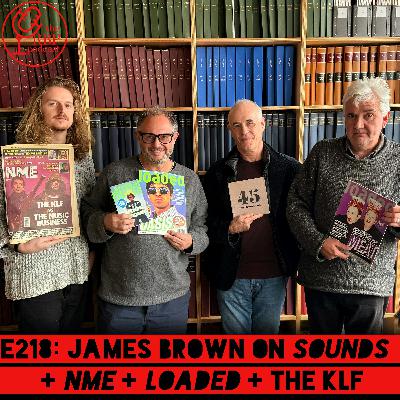
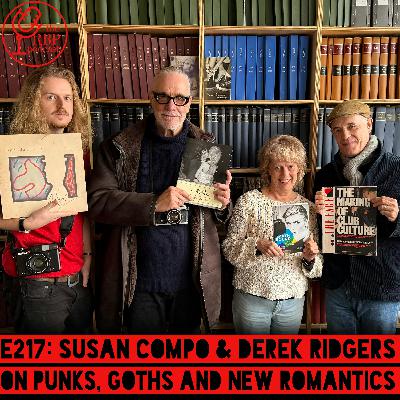
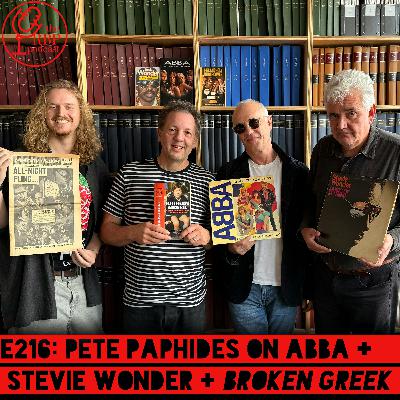


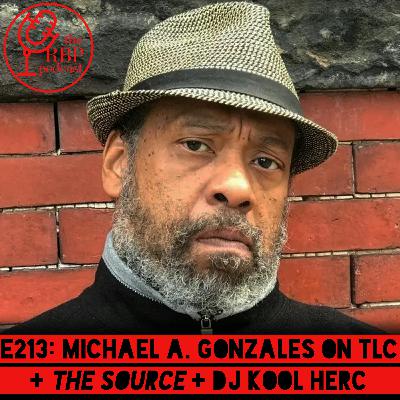
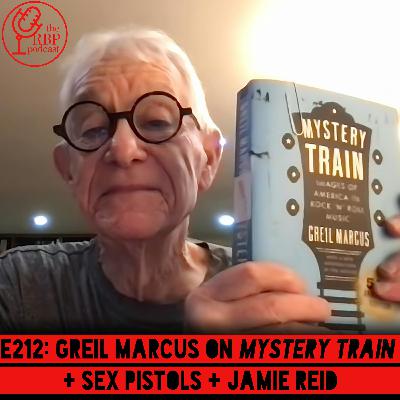
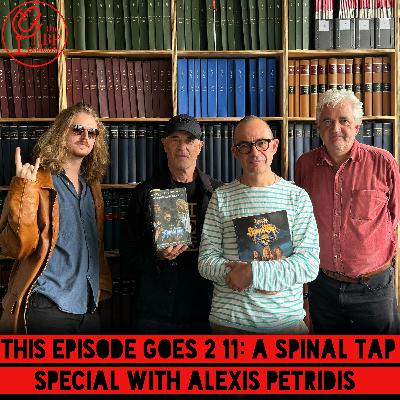

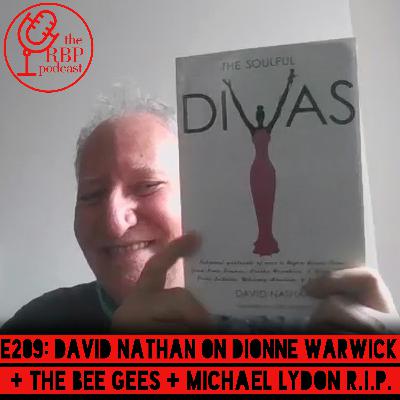
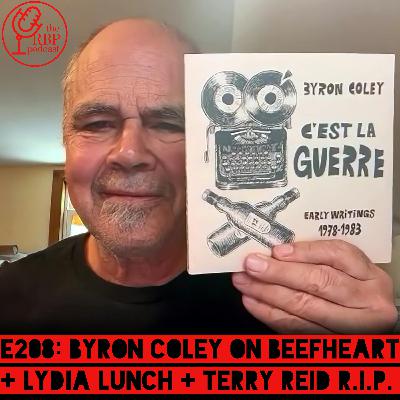
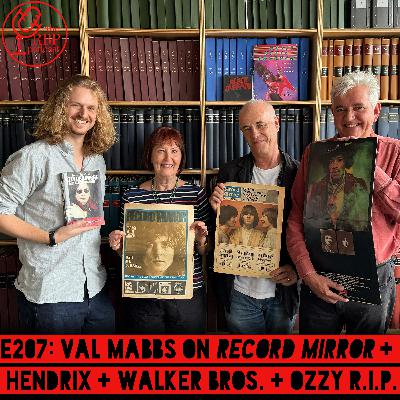
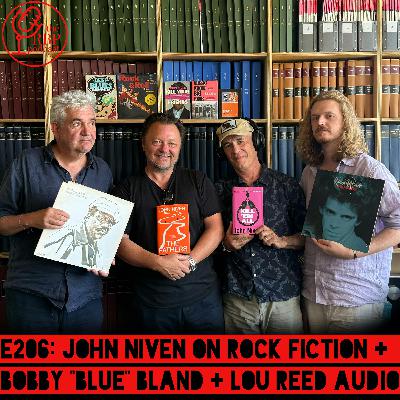

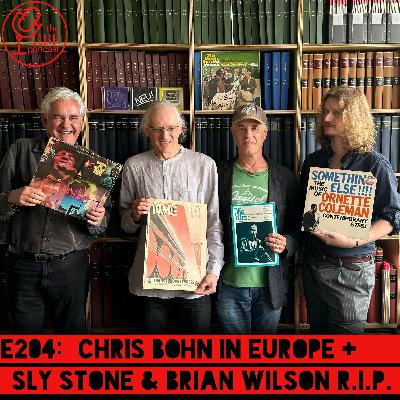
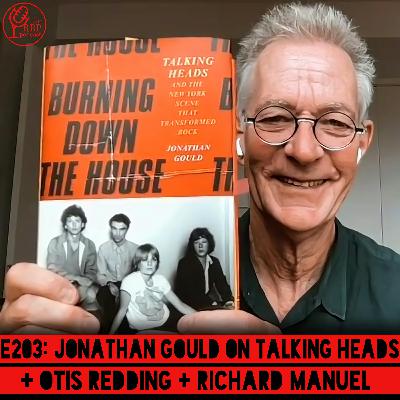
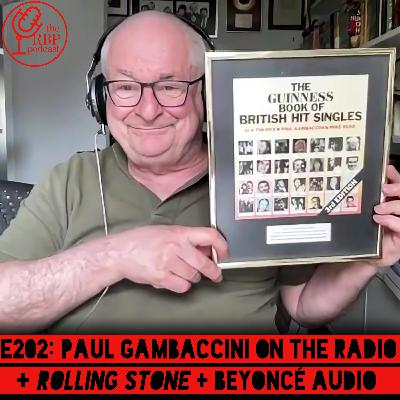
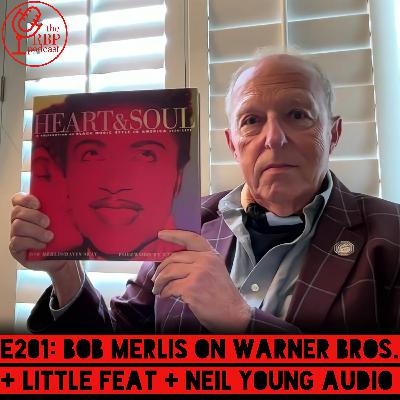
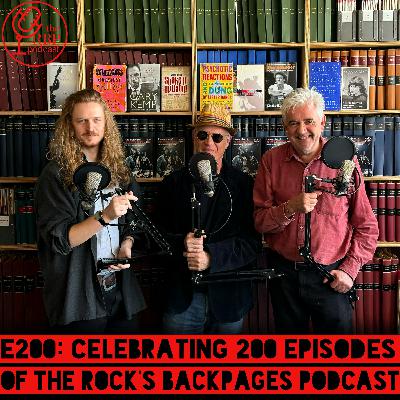
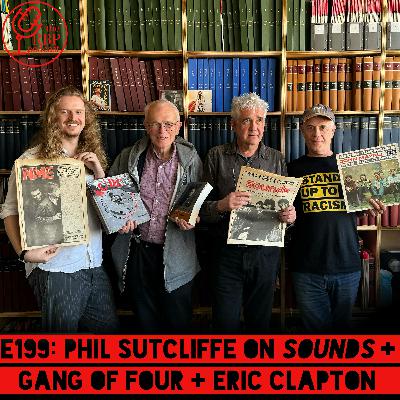



n .. ç v